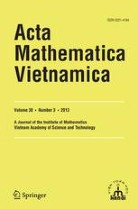
Acta Mathematica Vietnamica
- Volume 50
- Volume 49
- Volume 48
- Volume 47
- Volume 46
- Volume 45
- Volume 44
- Volume 43
- Volume 42
- Volume 41
- Volume 40
- Volume 39
- Volume 38
- Volume 37
- Volume 36
- Volume 35
- Volume 34
- Volume 33
- Volume 32
- Volume 31
- Volume 30
- Volume 29
- Volume 28
- Volume 27
- Volume 26
- Volume 25
- Volume 24
- Volume 23
- Volume 22
- Volume 21
- Volume 20
- Volume 19
- Volume 18
- Volume 17
- Volume 16
- Volume 15
- Volume 14
- Volume 13
- Volume 12
- Volume 11
- Volume 10
- Volume 9
- Volume 8
- Volume 7
- Volume 6
- Volume 5
- Volume 4
- Volume 3
- Volume 2
- Volume 1
The Decomposition of $\mathrm{Hom}_k^{}(S,k)$ into Indecomposable Injectives
Amnon Neeman
Abstract
Let $S$ be an algebra essentially of finite type over a field $k$. Then $\mathrm{Hom}_k^{}(S,k)$ is an injective $S$--module, and the Matlis structure theorem (Matlis, E.: Pacific J. Math. 8, 511–528 1958) tells us that it can be written as a direct sum of indecomposable injectives. We compute the multiplicities of these injectives. Let $\mathfrak{p}$ be a prime ideal in $S$, and let $I(\mathfrak{p})$ be the injective hull of $S/\mathfrak{p}$. If the residue field $k(\mathfrak{p})$ is algebraic over $k$ then the multiplicity of $I(\mathfrak{p})$ is $\mu(\mathfrak{p})=1$. If the transcendence degree of $k(\mathfrak{p})$ over $k$ is $\geq1$ then $\mu(\mathfrak{p})\geq{|\#k|}^{\aleph_0}$, that is the multiplicity is no less than the cardinality of the field $k$ raised to the power $\aleph_0$. If $S$ is finitely generated over $k$ then equality holds, that is $\mu(\mathfrak{p})={|\#k|}^{\aleph_0}$. For $k(\mathfrak{p})$ of transcendence degree $\leq1$ the result is not surprising, but for $k(\mathfrak{p})$ of transcendence degree $\geq2$ it is not clear that $\mu(\mathfrak{p})\neq 0$. We prove the result by induction on the transcendence degree, and the key is that we produce an injective map, from a space whose dimension we know by induction and into the space whose dimension we want to estimate. The interest in the result comes from the fact that the size of $\mu(\mathfrak{p})$ measures the failure of a natural map $\psi(f):f^\times\longrightarrow f^!$ to be an isomorphism. Here $f^\times$ and $f^!$ are the twisted inverse image functors of Grothendieck duality.


